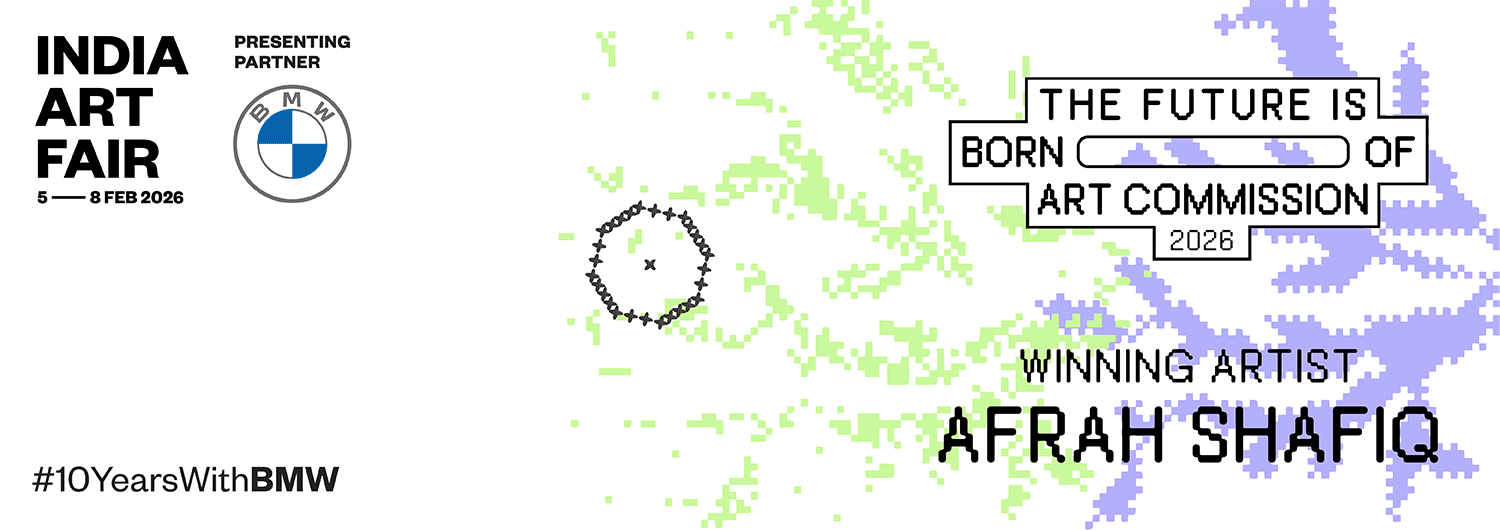Several artists today dedicate their work to reimagining the notion of sites and infrastructures for their practice, testing the relationships between the environment and the body, history and memory. This panel looks at how artists are occupying, inhabiting, and producing new sites of encounter for and through their art. Artists Maksud Ali Mondal, Mohit Shelare, Jasmine Nilani Joseph and Natasha Jozi will have a conversation moderated by Aasma Tulika.
The session will take place from 6:10pm – 7:20pm (New Delhi/Colombo) | 6:25pm – 7:35pm (Kathmandu) | 5:40pm – 6:50pm (Islamabad) | 6:40pm – 7:50pm (Dhaka). To register and join, click here.
ABOUT THE SPEAKERS
Aasma Tulika is interested in moments that disturb belief systems, and how mechanisms of control operate in such encounters experienced in everyday life. She locates technological infrastructures as sites to unpack the ways in which power embodies and affects narrative-making processes. Her practice engages with narratives that circulate on social networks and mass media, to record and draw out experiences of ideological disorientations and slips. She has been a fellow at the Home Workspace Program 2019-20, Ashkal Alwan, Beirut, and is currently participating in ‘Capture All: A Sonic Investigation’ supported by Liquid Architecture, Melbourne, and Sarai, Delhi. She is a member of the collective -outofline-, and collaboratively maintains a home server hosting thismightnotbe.online.
Maksud Ali Mondal was born in Bankura, West Bengal, India. He completed his BFA and MFA from Kala- Bhavana, Visva-Bharati, Santiniketan in 2019 with a semester at Royal Academy of Art, Netherlands, in 2016. His practice includes facilitating an experiential understanding of organisms in a durational, built microcosm, using sculpture, painting, drawing, installation and photography. His work deals with microbial contamination as a conversational expression, based on observation of growth, transformations and decomposition of organic matter by bacteria, fungi, creatures, fermentation, oxidation, rotting and with the organic, manmade found objects and everyday discarded materials in his work. He was part of Kochi-Muziris Students’ Biennale in 2018-19; the Serendipity art Festival’s collaboration with Foundation for Indian Contemporary Art in 2019; Five Million Incidents organised by the Goethe Institut, Delhi and Kolkata, and conceived by Raqs Media Collective in 2020, and Artissima Art Fair, Italy, in 2021.
Mohit Shelare trained as a painter and developed his interest in performance, specifically reading the body in protest practices. He facilitates research and modules to universities and institutions. Presently, working as an assistant professor at Hindustan University, Chennai, and researcher at Ben-Gurion University of the Negev, Israel. Mohit’s practice investigates sewage lines, biometric machines and dance. His works expand through the fundamental body gestures such as breathing, drinking, standing and conceptualise them with the mechanisms of violence. He brings drawings and text alongside remains of the performances and creates a mental reconstructions of the situations, sites and events.
Jasmine Nilani Joseph born in Jaffna is a practising artist, holds her Bachelor of Fine Arts from the University of Jaffna. She has participated in many group exhibitions, Including Serendipity Arts Festival 2017, Goa; Dhaka Art Summit, 2018, Bangladesh; Colomboscope Arts Festival, 2019, Colombo; Museum of Modern and contemporary Art Sri Lanka, 2019/2020. And she exhibits her works in galleries in Colombo and New Delhi since 2017. As an artist-in-residence she had the open studio, at Pepper House in Kochi, organized by the Kochi Biennale foundation in 2020. Jasmine’s works have reached many private collections and has been published in international journals and PHAIDON’s Book of the best of contemporary drawing, Vitamin D3. She is exhibiting her works in the 10th Asia Pacific triennial, Brisbane 2021 from Jaffna, Sri Lanka.
Natasha Jozi is a Fulbright scholar, performance artist and curator from Pakistan, interested in the collective human experiences, South Asian rituals and the intersection of science and the spiritual body. She has widely performed and exhibited her work in Germany, Pakistan, New York, Chicago, Delaware, Canada, UK, Switzerland, Korea, India, Sri Lanka, and Venice. She is the founder and director of House Ltd. an independent initiative that explores the notion of ‘City as a performing organism’ and works towards generating a discourse around performance art in Pakistan. Through her curatorial projects, she strives to generate critical discourse around body, gender and censorship. Jozi recently published her essay titled I am, A Spectacle: Reclaiming Female Consciousness through Performance Art in Pakistan in an academic journal, Research in Arts and Education. Jozi resides and works between Pakistan and Germany.
ABOUT STAGING THE CONTEMPORARY
‘Staging the Contemporary: The Next Generation’ is a two-day symposium and knowledge platform presented by India Art Fair and Ishara Art Foundation and is supported by Shiv Nadar University. The symposium aims to bring together the next generation of artists, curators, collectives and writers working in South Asia to deliberate on the urgencies, methodologies and infrastructures that lay new foundations for cultural practices today.



